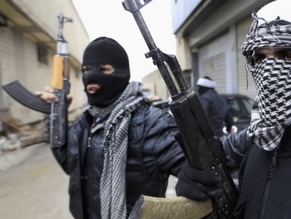|
World Jewish News

Soldiers from the Free Syrian Army hold up their rifles in a Damascus suburb, January 27, 2012. Photo by: Reuters
|
Russia refuses to support UN draft resolution against Syria
03.02.2012, Israel and the World Russia cannot support a European-Arab draft UN Security Council resolution on Syria despite changes that took some of its concerns into account, the Interfax news agency quoted Deputy Foreign Minister Gennady Gatilov as saying on Friday.
Gatilov did not specify whether Russia would veto the resolution, which supports an Arab League plan that calls for Syrian President Bashar Assad to cede power, or abstain if it comes to a vote in the Security Council in its current form.
"We have received the text. Some of our concerns and the concerns of those with like minds have been taken into account in it, but nonetheless, this is not enough for us to be able to support it in this form," he was quoted as saying.
Western and Arab nations that have pushed for Assad to give up power after an 11-month government crackdown that the United Nations says has led to more than 5,000 deaths are struggling to overcome Russian resistance to Security Council action.
They revised a draft resolution first circulated last month to deal with Russia's concerns, adding some language it wanted and removing sections that Moscow had suggested would prompt it to use its veto power as a permanent Council member.
The latest version does not criticize arms sales to Syria and includes language aimed to allay what Russia says are its concerns the resolution could be used to justify foreign military intervention in Syria, which it adamantly opposes.
The draft, circulated by Morocco on Thursday, calls for a "Syrian-led political transition" and makes no specific mention of what the Arab League plan to end the bloodshed entails, such as Assad giving up power.
However, the draft resolution still "fully supports" the plan, which Russia has complained contains too many specifics that could predetermine the outcome of a settlement dialogue between the government and its opponents.
Russia has said political decisions such as a transfer of power must be made only as a result of dialogue inside Syria, not set in advance from outside.
Gatilov did not say what Russia objected to specifically in the new version. In a statement that made no comment on the draft, the Foreign Ministry said Moscow "sees any attempts to force recipes of overcoming the internal crisis in Syria as unacceptable."
Russian diplomats have sometimes used the wording "cannot support" to warn of a potential veto, but the language leaves room for an abstention. Foreign Ministry officials could not immediately be reached for comment.
Assad's government has given post-Soviet Russia its firmest foothold in the Middle East, buying Russian weapons and hosting a naval maintenance facility on its Mediterranean coast that is Russia's only military base outside the former Soviet Union.
Russia and China vetoed a European-drafted resolution on Syria in October, with the Kremlin saying it put too little blame on Assad's opponents and could have opened the way to Western military intervention.
Russia allowed a Security Council resolution authorizing air strikes on Libya by abstaining in a vote last year and then accused the United States and its NATO allies of overstepping its bounds and using it to help rebels oust Muammar Gadhafi.
Haaretz.com
|
|
